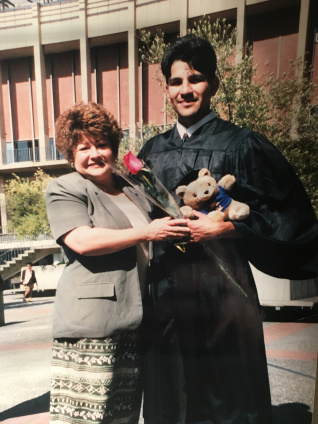(9-28-20) Michael Estrada has made a powerful hour-long documentary entitled Benevolent Neglect that chronicles his decade long journey trying to help his seriously mentally ill mother, Josie.
A teacher, Estrada, took a year sabbatical to make his film with small contributions from friends but no movie making experience after his mother died in 2018. Benevolent Neglect is such an important film, I believe it should be shown in every National Alliance On Mental Illness chapter, circulated by the National Council on Behavioral Health, and watched by our elected leaders.
It is both a painful reminder that we are not doing enough to avoid what Estrada notes is “much sorrow, needless suffering and preventible deaths.”
In telling his mother’s story, Estrada shares a much bigger story about how our legal and health care system are contributing to suffering rather than helping protect and heal.
Because Estrada wanted to add context to his documentary, he interweaves such larger issues of deinstitutionalization, involuntary commitment, and shortages of crisis care beds into his film. But the most revealing moments come when Estrada takes viewers into his world as events with his mother unfold. A Modesto police officer refuses to involuntary commit Josie so she can go to the hospital even though she is clearly a danger to herself. Why? Because she is able to tell him what day and month it is, along with the name of her street. A hospital supervisor ignores Estrada’s pleas even though his mother has nearly died because voices are telling her not to take her diabetes medication. Why? Because Josie wants to be discharged and the supervisor doesn’t want responsibility for her. A California Department of Mental Health employee rebuffs Estrada when he says his mom has been kicked out of so many apartments, she now is homeless. Why? Because she is living in her car and therefore has a roof over her head.
The fact that Josie presents well, is well-groomed and can carry on a conversation without a hint of her illness stymies Estrada’s efforts to get her care even when voices in her head cause her to pull covers over her head and cower during a “spiritual attack” and when those same voices convince her that her diabetes medicine is poison and the FBI is watching her.
Josie’s actions are so troubling that they eventually cause her to be held involuntarily five times under California’s 5150 law. (Nearly always after she is stopped by police driving erratically and delusional.) But she is always released within 24 hours and always without any treatment.
Estrada proves tireless in trying to stop his mom’s progressive decline.
Begging, badgering, demanding, and arguing with anyone in the legal and medical profession who will listen, but he only succeeds once in getting her before a psychiatrist and only for a short period before the voices tell her to stop. Even though her world is crumbling around her – a divorce, repeatedly being evicted from apartments, and strained relationships – Josie proves incapable of accepting that she needs help and her family proves helpless at intervening. 
All of us rejoice when we read accounts about individuals, such as my son Kevin, who get treatment and the tools needed to control the symptoms of their illnesses and do well in life. I believe most Americans with mental illnesses can but Estrada’s film reminds us that getting that help often proves impossible.
It shouldn’t be this way.
Estrada began blogging on his website, Benevolent Neglect, about his mother’s illness and his frustration in trying to get her decent help shortly after he became her primary caregiver in 2016 . That same year, I posted my first blog written by him about Josie: “A Loving Son Cares For Hiss Ill Mother: Struggling to Navigate System & Deal With Her Voices. Two years later, I posted an update that Estrada wrote about his mom. “Her Son Said She Was Homeless, Mentally Ill, Living In A Car. The Response: Technically, She Has Roof Over Her Head.”
Estrada is still struggling with Josie’s death. He refers to himself as a “recovering caregiver.” His film is his tribute to his mom. It is also a call to all of us to find a better way than what now exists.

My mother was laid to rest wearing her favorite peach dress and white sweater and the necklace I bought her for Christmas – Michael Estrada.



